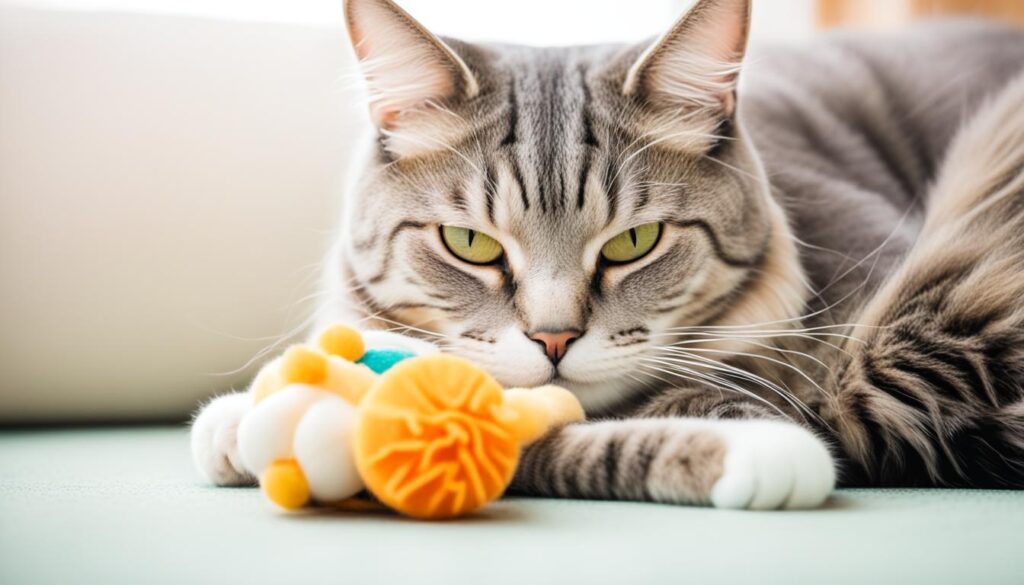Why Does My Cat Bite My Feet?: Did you know that over 70% of cat owners have experienced their feline companions biting their feet? It may seem like a strange behavior, but there are actually several reasons why cats engage in this behavior. Understanding why your cat bites your feet is essential in addressing this issue and maintaining a harmonious relationship with your furry friend.
- Moving feet can trigger a cat’s natural instincts to pounce and play, as they resemble prey.
- Boredom and a lack of stimulation can contribute to foot biting, as cats seek attention and release excess energy.
- The hunting instinct in cats plays a significant role in foot biting, especially for younger and indoor cats.
- Foot biting can also be a result of overstimulation aggression or a response to stress and pain.
- Addressing foot biting requires understanding your cat’s behavior, providing appropriate toys and playtime, and addressing any underlying issues or stressors.
Cats Love to Play and Bite Our Feet
Play is a major reason why cats bite our feet. Moving feet resemble prey to cats, and their instincts drive them to pounce and bite. Cats find it fun to chase and engage with moving objects, and our feet provide an accessible target. This playful behavior is usually gentle and does not cause harm.
Understanding cat body language can help prevent bites by recognizing when a cat is in a playful mood. Some common signs include twitching tail, dilated pupils, and a crouched posture. When you notice these signals, it’s important to redirect your cat’s play behavior to appropriate toys. Providing interactive toys, such as feather wands or small balls, helps stimulate their natural hunting instincts and redirects their energy away from biting feet.
Cats are also more likely to bite feet when they are bored or understimulated. Interactive playtime with your cat gives them an outlet for their energy and satisfies their natural hunting instincts. It’s important to engage in regular play sessions to provide mental and physical stimulation. Set aside dedicated playtime each day and experiment with different toys to keep your cat entertained and engaged.
When playing with your cat, it’s essential to avoid using your hands or feet as toys. This can blur the line between play and aggression and may encourage your cat to continue biting. Instead, use toys on strings or wands to create distance between your body parts and your cat’s teeth. This teaches them that biting feet is not acceptable play behavior.
Recommended Cat Toys:
- Feather wands
- Interactive puzzle toys
- Balls with bells
- Catnip-filled toys
By providing your cat with the appropriate play outlets and understanding their body language, you can prevent and discourage biting feet. Remember to always reward good behavior and avoid punishment, as positive reinforcement is key to effective training. With consistent effort and patience, you can foster a strong bond with your cat and create a harmonious play environment.
The Hunting Instinct and Foot Biting
When it comes to foot biting, one of the key factors to consider is a cat’s hunting instinct. Even in domesticated environments, cats still possess strong hunting instincts that drive their behavior. This instinct can manifest in stalking behavior before biting feet, and these bites can be more painful and may even draw blood.
From a cat’s perspective, our feet resemble their typical prey in terms of size and shape. This can trigger their hunting instinct and make them see our feet as targets. Younger cats and indoor cats, in particular, may be more prone to foot biting as they explore their instincts and have limited opportunities for hunting in their environment.
Understanding the triggers for cat aggression, such as the hunting instinct, is crucial in training and preventing foot biting. By recognizing that foot biting is rooted in a cat’s natural behavior, we can employ appropriate training techniques to redirect their focus and decrease the occurrence of foot biting.
Training Tips to Prevent Foot Biting
- Provide alternative outlets for hunting behavior, such as puzzle toys or interactive play sessions. This allows cats to engage in their natural hunting instincts without targeting our feet.
- Use positive reinforcement to reward good behavior and discourage foot biting. When your cat shows appropriate play behavior, offer treats or verbal praise to reinforce that this is the desired behavior.
- Establish a consistent training routine with regular playtime sessions. Engaging your cat in stimulating activities will help provide an outlet for their hunting instinct and reduce their focus on foot biting.
By taking into account a cat’s hunting instinct and implementing targeted training techniques, we can curb foot biting behavior and create a harmonious environment with our feline companions.
Boredom and Attention Seeking Behavior

Boredom can be a significant factor contributing to cats biting their owner’s feet. When cats lack sufficient mental and physical stimulation, they may resort to attention-seeking behaviors. Biting feet becomes a way for them to release excess energy and seek interaction.
As a responsible pet owner, it’s crucial to address your cat’s boredom to mitigate foot biting. Providing interactive toys that engage their senses and challenge their mental abilities can be highly effective. These toys should mimic natural prey and encourage hunting behavior, redirecting their focus away from your feet.
Engaging in regular playtime sessions with your feline friend is another excellent way to combat boredom. Not only will it alleviate their pent-up energy, but it will also strengthen the bond between you and your cat. Dedicate designated play sessions each day to keep your cat entertained and mentally stimulated.
Creating an enriched environment is equally important in preventing boredom-related foot biting. Offer a variety of scratching posts, climbing surfaces, and hiding spots to appeal to your cat’s natural instincts. Consider adding vertical spaces, such as cat trees or shelves, as they provide opportunities for exploration and aerial views.
| Key Tips | Benefits | Examples |
|---|---|---|
| Provide interactive toys | Stimulates hunting and mental stimulation | Fishing rod toys, puzzle toys |
| Engage in regular play sessions | Reduces excess energy and strengthens the bond | Feather wands, laser pointers |
| Create an enriched environment | Appeals to natural instincts and provides stimulation | Vertical spaces, hiding spots |
Redirecting your cat’s attention to appropriate toys and rewarding positive behavior can help discourage foot biting and channel their energy into healthier forms of play. When your cat engages with their toys instead of biting your feet, be sure to provide verbal praise and treats to reinforce their good behavior.
Overstimulation Aggression and Foot Biting
Cats can sometimes exhibit aggressive behavior, including biting feet, when they become overstimulated. When a cat becomes overwhelmed with attention, they may react defensively by biting or scratching. Signs of overstimulation aggression include tail twitches, flattened ears, dilated pupils, and growling. It’s essential to understand the triggers for this behavior and address any underlying issues that may contribute to overstimulation aggression.
One common trigger for overstimulation aggression is pain. If a cat is in physical discomfort, even a gentle touch can elicit a defensive response. Similarly, stress can heighten a cat’s sensitivity and make them more prone to overreacting. To manage overstimulation aggression and reduce foot biting, it’s important to address any potential medical issues and reduce stress in a cat’s environment.
Creating safe spaces for your cat to retreat to when they feel overwhelmed can help alleviate their stress levels. These spaces can be equipped with cozy beds or hiding spots where your cat can feel secure. Additionally, synthetic cat pheromones, such as Feliway, can help create a calming environment for your cat.
Consulting with a veterinarian or veterinary behaviorist is also advisable when dealing with overstimulation aggression. They can provide professional guidance and help develop a tailored behavior modification plan for your cat. This may involve training techniques such as desensitization or counterconditioning to help your cat become more comfortable in stimulating situations.
Remember, addressing overstimulation aggression requires patience, consistency, and a deep understanding of your cat’s individual needs. By taking proactive steps to reduce stress, create a safe environment, and seek professional guidance when necessary, you can effectively manage overstimulation aggression and reduce foot biting.
Addressing Foot Biting Problems
Foot biting can be a problem if it becomes frequent or results in injuries. Understanding the underlying causes, such as boredom, attention seeking, or aggression, is crucial in addressing the behavior. By identifying the triggers for cat aggression, you can effectively implement cat training tips to prevent foot biting.
If your cat frequently bites your feet, it’s important to address the behavior promptly. Ignoring the foot biting can send a message to your cat that this aggressive behavior is acceptable. Instead, redirect your cat’s focus to toys or other appropriate objects. This helps to shift their attention away from foot biting and onto more desirable behaviors.
When it comes to training your cat, avoiding reinforcement of aggressive behavior is important. Do not play rough or encourage biting during playtime. Rather, reward good behavior, such as playing with toys or engaging in appropriate activities, with treats and praise. Positive reinforcement can be a powerful tool in correcting foot biting.
Preventing Foot Biting: Training Tips
To prevent foot biting, follow these cat training tips:
- Provide appropriate toys: Keep your cat entertained with interactive toys that simulate hunting. This can help redirect their natural instincts away from biting feet.
- Engage in regular playtime: Dedicate time each day to play with your cat using interactive toys. This helps them release excess energy and reduces the likelihood of foot biting.
- Create an enriched environment: Ensure your cat’s environment is stimulating by offering scratching posts, climbing trees, and hiding spots. This provides alternative outlets for their energy.
- Identify and address stressors: Reduce stress in your cat’s environment by minimizing loud noises, providing a safe space, and using synthetic cat pheromones. Consult with a veterinarian or veterinary behaviorist for additional guidance.
- Be consistent and patient: Changing your cat’s behavior takes time and consistency. Stay committed to training techniques and remain patient throughout the process.
By implementing these cat training tips and addressing any medical issues or stressors, you can effectively prevent and correct foot biting in your cat.
What to Do When Your Cat Bites Your Feet
When your cat bites your feet, it’s important to respond appropriately to discourage the behavior. Ignoring the biting and calmly removing yourself from the situation can send a message to your cat that this behavior is not acceptable. Redirection can also be effective by providing alternative toys or activities to engage your cat’s attention. Using positive reinforcement, such as treats and praise, when your cat engages in appropriate play can reinforce good behavior. It’s crucial to avoid negative punishments or yelling, as this can damage the bond with your cat and make them fearful. Consistency and patience are key in training your cat to stop biting your feet.
Addressing Underlying Causes of Foot Biting
If your cat’s foot biting is frequent or severe, it’s important to consider any underlying causes. Medical issues, such as pain or stress, can contribute to aggressive behavior. Consulting with a veterinarian can help identify and address any medical issues that may be causing foot biting. Stress relief techniques, such as providing a safe and comfortable environment, using synthetic cat pheromones, and creating spaces for your cat to rest or hide, can help reduce aggression. Working with a veterinarian or veterinary behaviorist can provide further guidance in managing and addressing foot biting caused by underlying issues.
How to Stop Foot Biting in Cats

To address foot biting in cats, a combination of cat training techniques and understanding your cat’s behavior is essential. By following these tips, you can train your cat to stop biting your feet.
1. Ignoring Unwanted Behavior
When your cat bites your feet, avoid reacting with loud noises or punishment. Instead, calmly withdraw your attention and remove yourself from the situation. This teaches your cat that biting will not elicit any response or reward.
2. Redirecting Focus to Toys
Provide your cat with appropriate toys to redirect their biting behavior. Interactive toys that mimic prey-like movements can engage their hunting instincts and provide an alternative outlet for their energy. Encourage your cat to play with these toys by using them during regular play sessions.
3. Positive Reinforcement
Whenever your cat engages in appropriate play or refrains from biting your feet, reward them with praise and treats. Positive reinforcement reinforces good behavior and encourages your cat to continue engaging in play without resorting to biting.
4. Consistency and Patience
Changing your cat’s behavior takes time and patience. Be consistent in applying training techniques and avoid unintentionally reinforcing their biting behavior. With persistence and consistency, your cat will learn new habits and begin to reduce foot biting.
5. Address Underlying Issues
Foot biting can be a sign of underlying medical issues or stress in your cat’s life. Consult with a veterinarian to rule out any medical causes and discuss possible stressors in your cat’s environment. By addressing these factors, you can help prevent foot biting and promote overall well-being.
By implementing these cat training tips and techniques, you can effectively stop foot biting in cats and foster a peaceful and harmonious relationship with your feline companion.
Conclusion
Understanding cat behavior is key when it comes to addressing and preventing foot biting. Cats may bite their owner’s feet for various reasons, including play, hunting instincts, boredom, and attention seeking. To prevent foot biting, it’s important to provide appropriate toys for your cat’s playtime and engage in interactive play sessions. This helps redirect their focus and energy away from biting feet.
Addressing any underlying medical issues and stress is also crucial in preventing foot biting. Consulting with a veterinarian can help identify and address any health concerns that may contribute to aggressive behavior. By creating a stimulating and enriched environment for your cat, you can help alleviate boredom and reduce the likelihood of foot biting.
Positive reinforcement plays a significant role in preventing foot biting. Rewarding good behavior with treats and praise can reinforce appropriate play and discourage biting. Additionally, understanding your cat’s body language and building a strong bond with them fosters a harmonious environment and decreases foot biting incidents. By using these strategies, you can effectively address and prevent foot biting in your cat, promoting a happy and healthy relationship.








[…] Cats bite and chew their nails for several reasons. It helps them remove the outer layers of their claws, keeping them sharp and healthy. Additionally, cats use this behavior to keep their paws clean, removing any dirt or debris that may have accumulated. However, excessive nail biting can be a cause for concern and may indicate underlying health issues or behavioral problems. […]
[…] on managing cat arthritis. From understanding the causes and clinical signs of arthritis in cats to diagnosing the condition and exploring various treatment options, I will guide you through the […]
[…] Cats engage in rough play that can escalate to biting and scratching. […]
[…] this article, we will delve into the fascinating world of cat behavior to uncover the reasons behind kneading and biting. From understanding the instinctual origins of this behavior to learning how to redirect it, we […]
[…] Cat sleeping at your feet or snuggling up to you […]
[…] their distinct characteristics and the care they need to thrive. Whether you’re a seasoned cat owner or just curious, this guide will cover everything you need to know about these fascinating […]